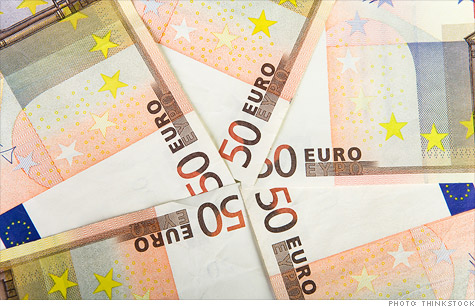Search News

The euro currency faces many challenges in the next few weeks.
NEW YORK (CNNMoney) -- Spain officially requested a bailout for the nation's banks Saturday but euphoria about the weekend's announcement was short-lived.
Stocks were lower Monday morning as the market quickly remembered that the euro currency union faces several key hurdles. Here is what investors need to focus on in the days and weeks ahead.
Spain: While investors initially cheered the plan to rescue Spanish banks, many details remain to be finalized, including how much money the banks will need.
European Union finance ministers agreed Saturday to lend up to €100 billion to the Spanish bailout fund to recapitalize insolvent banks. But the amount needed will not be known until an external audit of the banks is completed later this month.
It's also unclear how the loans will impact the Spanish government's credit rating, although the rescue will not involve any new austerity measures. Investors are on the lookout for another downgrade of Spanish debt after Fitch cut the nation's credit rating to one step above junk status last week.
The deal was put together quickly as EU authorities hope to eliminate speculation about Spanish banks ahead of the elections in Greece.
"The plan looks like a classic eurozone fudge," banking analysts at Societe Generale wrote in a note to clients.
Spain also has many challenges beyond the banks. Unemployment stands at nearly 25%. Spain has a relatively low level of public debt, but the government has had trouble recently borrowing in the bond markets as investors demand higher interest rates.
Greece: After last month's election failed to produce a governing coalition, Greek voters will return to the polls Sunday.
The concern is that anti-austerity politicians will win enough seats in Parliament to derail the bailout program Greece secured earlier this year. That would put the nation in jeopardy of being forced out of the euro currency union.
Analysts are expecting a close race between the far-left Syriza and moderate New Democracy parties. But neither group is expected to win an absolute majority, according to Wolfano Piccoli, a director at political research firm Eurasia Group.
"Regardless of the final outcome, there is a significant risk that these elections would lead to the creation of a weak short-term government, leaving the country leaderless and adrift," said Piccoli.
France: Greece is not the only country holding elections Sunday.
French President Francois Hollande's Socialist Party made gains in the first round of legislative elections over the weekend. But the ultimate balance of power in the National Assembly will not be determined until after runoff elections on June 17.
The concern is that Socialist Party candidates will not win the 289 seats required to form a majority and will need to join forces with the Left Front, which opposes government austerity measures.
This outcome would pull the French government further to the left and widen divisions between Paris and Berlin over how to manage the euro crisis, said Alastair Newton, a geopolitical analyst at Nomura Securities.
Banking union: European Union leaders are expected to discuss plans to form a banking union in Europe when they hold a summit June 28-29.
The EU proposal would include a single deposit guarantee organization covering all banks in the union, something similar to the FDIC in the U.S..
There would also be a common authority and a common fund that would deal with bailouts needed for the cross-border banks that are major players in the European banking system.
In addition, there would be a single EU supervisor with ultimate decision-making powers for the major banks, and a common set of banking rules.
The move would represent a step towards greater centralization of European authority. But it remains to be seen if all 17 eurozone governments will agree to sacrifice sovereignty for the sake of the union.
ECB: The European Central Bank is widely expected to announce a 0.25% interest rate cut at its next policy meeting in July.
At its June policy meeting, the ECB left its benchmark rate unchanged at 1%, where it has been since December.
The ECB is under pressure to act as recent reports suggest the eurozone economy is headed for a slowdown in the second quarter. Eurozone manufacturing activity fell in May to its lowest level in nearly three years, while unemployment rose in April to 11%, the highest level since the euro was launched.
Gross domestic product in the eurozone stagnated in the first quarter of 2012, following a decline of 0.3% in the final three months of 2011. There are 11 countries in the EU that are now judged to be in recession, including Greece and Spain. ![]()
| Index | Last | Change | % Change |
|---|---|---|---|
| Dow | 32,627.97 | -234.33 | -0.71% |
| Nasdaq | 13,215.24 | 99.07 | 0.76% |
| S&P 500 | 3,913.10 | -2.36 | -0.06% |
| Treasuries | 1.73 | 0.00 | 0.12% |
| Company | Price | Change | % Change |
|---|---|---|---|
| Ford Motor Co | 8.29 | 0.05 | 0.61% |
| Advanced Micro Devic... | 54.59 | 0.70 | 1.30% |
| Cisco Systems Inc | 47.49 | -2.44 | -4.89% |
| General Electric Co | 13.00 | -0.16 | -1.22% |
| Kraft Heinz Co | 27.84 | -2.20 | -7.32% |
| Overnight Avg Rate | Latest | Change | Last Week |
|---|---|---|---|
| 30 yr fixed | 3.80% | 3.88% | |
| 15 yr fixed | 3.20% | 3.23% | |
| 5/1 ARM | 3.84% | 3.88% | |
| 30 yr refi | 3.82% | 3.93% | |
| 15 yr refi | 3.20% | 3.23% |
Today's featured rates: